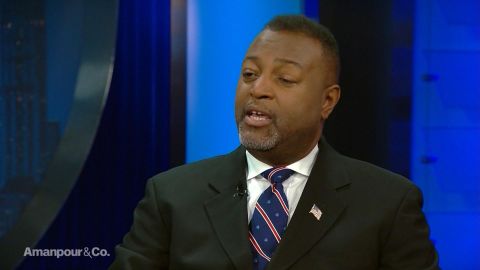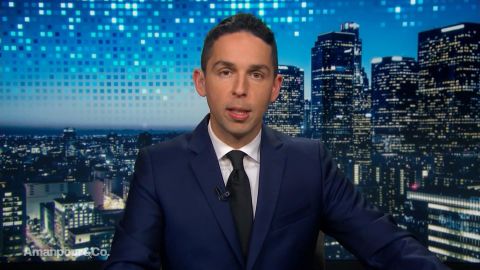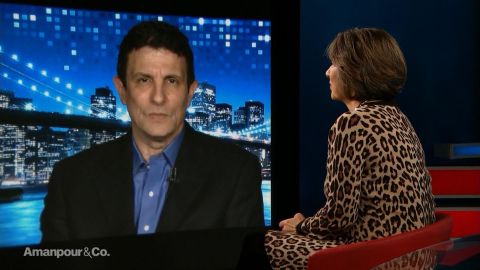Read Transcript EXPAND
AMANPOUR: Josh Campbell, formerly of the FBI, thank you so much in deed. One of Robert Mueller’s main areas of his investigation is 2016 Russian hacking of the Democratic National Committee. Malcolm Nance is a respected counter-terrorism analyst and he’s an author who is that forefront of reporting the DNC cyber-attacks. His latest book “The Plot to Destroy Democracy” examines how he believes President Putin is actively undermining American politics, and he is joined by our Alicia Menendez in New York to talk about it.
(BEGIN VIDEO CLIP)
ALICIA MENENDEZ, PBS CORRESPONDENT, AMANPOUR & COMPANY: Malcolm, thank you so much for joining us.
MALCOLM NANCE, COUNTER-TERRORISM ANALYST AND AUTHOR OF “THE PLOT TO DESTROY AMERICA”: My pleasure to be here.
MENENDEZ: Here’s my first question and it’s an important one. How does one become a spy?
NANCE: Well, first off, I’m not a spy. And —
MENENDEZ: According to whom?
NANCE: According to the definition of what a spy really is and that’s terrible because I am on the board of the International Spy Museum in Washington but there are two types of actors in the intelligence community. We who are actually running intelligence operations, collecting intelligence, we tend refer to ourselves as intelligence collectors. The actual people like at the CIA who do it are CIA officers. Not agents. But the people that we get to betray their nation, let’s say in a human intelligence operation or to bring in a wiretap, a bug or something like that and plant it for you, they’re the spies.
MENENDEZ: What drew you to this work?
NANCE: Well, I grew in Philadelphia coming from a military family, a very old military family. There’s been a Nance father, son and my niece in the navy was in combat in Yemen last year. We have been in the armed forces since the civil war in every war.
MENENDEZ: Wow.
NANCE: And, you know, my father was a master chief petty officer. I’m one of five sons who were in the Navy. And I — you know, I grew up in Philadelphia. And I had a pretty good catholic upbringing. But while I was there, I think I was influenced subliminally. There’s a statue down in Washington square which is the first actual tomb of the unknown soldier and above the inscription of a statue of George Washington is the saying that freedom is a light for which many men have died in darkness. And now that I’m grown up and I see that statue and quote that, when I talk about intelligence activity, I think I was just subliminally influenced to go into that darkness and to see, you know, be the person to get information that really meant something. And you know, it is not like the movies at all. This is not a Jason Bourne world.
MENENDEZ: What is it instead?
NANCE: It is dedicated people that really don’t ask for any thanks, who come in and go to work day in and day out and do the hard work of collecting information, that’s secret, we generally — stolen because we take it from other countries without their knowing it. And processing that information and getting it to consumers like the President or the national security council staff or battle force commanders in a timely manner so Americans and American interests are not hurt. I’ve been in situations where I’ve had to make the recommendation that people, that facilities and structures to be destroyed right away or Americans would be killed or injured.
MENENDEZ: Draw a line for me from the skill set you possess to the analysis that you do in this new book.
NANCE: I started out in the cryptologic world that’s a small fraction of the U.S. intelligence community but in fact because of the nature of the way we collect the sensitivity of the material we collect, it’s sort of a best analogy to give you that without saying anything that’s classified is the way we broke the enigma codes in world war ii and one thing that a lot of people don’t understand because I’m a cryptologic linguist, I’m an Arabic interpreter, when information is broken or decrypted or it’s collected in whatever capacity that it comes in, you know, when I started out in Philadelphia as a young catholic school kid I grew up in an orthodox Jewish neighborhood and the first foreign language I learned was Yiddish and I would find scraps of Yiddish newspapers on the ground and one day I was curious. About 10 years old and I said I want a dictionary, I want an alphabet book to break out the letters. I learned a valuable lesson. All come out in a foreign language. So from there you have to have people like I said with the enigma codes of world war ii, everybody that worked on the mission was a German linguist because it’s in German and then translate it, take that information, analyze it, determine where its best viability is and then send it out to a reporter or work within the unit you’re in in order to use that information to the best effect and many times that effect was the destruction of enemy forces. So, how does that level of analysis which is really street level field analysis translate up into the geopolitical world? Because we collect from the rawest source and the rawest source is the mouth of your enemy. You’re not going to get anything better than that, especially when they don’t know you’re the third party on their phone call or they’re the third party in their communication.
MENENDEZ: How much of what we’re reading in the book is based on that type of sousing?
NANCE: Right. None of it. I’m not a journalist. Journalists have a very different way of looking at information and they have to have their sources and they go out and they validate them.
MENENDEZ: What is your way?
NANCE: As an intelligence collector, I have to look at it from the depth of all of my experience on the basis of military intelligence operations and see whether I can see patterns of foreign intelligence activities that would affect, you know, the — that would affect essentially the results that I’m seeing a play on television and in the electorate and that’s exactly what I saw. I saw a foreign intelligence operation that was very familiar to me. I grew up in the cold war. Even though I was a Middle East specialist. The KGB was everywhere. Especially in my world. We were hunted by the KGB and their goal was to find you, make contact and flip you, turn you into an asset and then have you become a spy, to betray your country. So, you were always wary of that. And so, when I saw the hacking of the DNC, well, that was an affect. Carried out an operation. Someone stole that information. That information had to come and surface in the media for a reason. And that reason could only be Watergate. Right? The exact same activity that was carried out in 1973, only there were no burglars and you actually could just walk in electronically, steal the information and then release it to the public and it could only have one affect and that was to damage and split the Democratic party into two.
MENENDEZ: You were at the forefront of ringing the alarm on this. Why were we hearing about this from you and not from the intelligence community establishment?
NANCE: Well, I was in media at that time and in fact I think I was the first person in U.S. media to — I went on air at MSNBC and pretty much surprised everybody on the production line where I said, you know, the first day of the Democratic National Committee and all this information was released through WikiLeaks and it literally created a split, a rift between the Bernie side and the mainstream side of the Democratic party and I went on air and I said the United States is attacked in a wide ranging cyber warfare operation to split the Democratic party in half and elect Donald Trump as President.
MENENDEZ: Did anyone say that’s dangerous and conjecture?
NANCE: No. Coming from my world, what we didn’t know at the time was that those same dates, John Brennan, the Director of the CIA and Jim Clapper, Director Of National Intelligence, were in a furious hunt to find American citizens who were known directing continuous contact with Russian intelligence and find the sources of the leaks that were coming from WikiLeaks, that were coming through WikiLeaks and, in fact, within a week John Brennan would be tasked by the President to call the director of Russian intelligence and tell him we know this is an intelligence operation.
MENENDEZ: In this book, you know, so often talking about Russia, especially in the U.S. media, we focus on the United States for obvious reasons but Putin’s making a global play here.
NANCE: Yes. Yes. What we see here, we are — I think the fault in the — a lot of the news media analysis and why people tend to pay more attention to intelligence, you know, intelligence officers, intelligence collectors, because we see this from a much broader geopolitical perspective. When I see that effect of the stolen e-mails, split the Democratic party in half, you know, I work this backwards. And I go, OK, that information came from here. We see this from a much broader geopolitical perspective. When I see that effect of the stolen e-mails, split the Democratic party in half, you know, I work this backwards. And I go, OK, that information came from here. Went through this conduit. That conduit from Russian military intelligence. Russian military intelligence stole that information and in their service for a year. That had to be ordered from the kremlin, an operational what we call an information warfare management cell and a term I made up which later we would find is the internet research agency. To steal that information, watch U.S. news media disseminate that information and reach a strategic goal for the President of Russia. That had to happen. It had to exist. And while U.S. intelligence was doing that job of finding that information, for me it was just easier to come in to media and sound the alarm bell and say, hey, you’re getting played on a very broad geopolitical scale but larger than breaking the Democratic party. If you’re going to put Donald Trump in as President of the United States, that means you have massaged him in some way. To know that you would have to know the President of Russia was a former KGB officer and his job was human intelligence. Which is to make people betray their own nation by thinking it is for their own good, to their own benefit and without thinking that they’re actually betraying their own country. And John Brennan actually said that in testimony before the senate intelligence committee. He said in his long experience people who were betraying the country had no clue that they were actually being traitors. Not that we’re using the technical term treason here but as someone that’s handled as we say and to be worked by a foreign power, to do their bidding, then there has to be a broader play for that nation.
MENENDEZ: So, what is Putin’s vision?
NANCE: Putin’s vision is very simple. He is making Russia great again. Russia’s essentially a trailer park with atomic bombs. It is a poor nation. The people there are poor.
MENENDEZ: So, wealth is the goal?
NANCE: Wealth is not the goal for the average person in Russia. It’s about bringing Russia back on to the stage as a global player, the way that Putin, former communist, right? Former Soviet Union acolyte of the world remembers Russia as an equal partner to the United States but doing it in such a way they don’t have to sell themselves the way China has and making themselves equal partners with the United States and to do that they have to bring the United States down and they have done a very good job of that.
MENENDEZ: Reading your book the question I came back to over and over again is, can the damage that’s been done be undone?
NANCE: Yes. Absolutely. I mean, when we talk about damage here, let’s be honest, we are talking about did damage that the current administration and President Donald Trump have impacted. The United States with. And to be quite honest I make it very clear in the book, he was co-opted early by the Russians. I don’t mean it in the sense he was, you know, offered money and become an agent. There’s steps to where you work yourself into a position where you don’t know that you are being handled or maybe you do. I mean, you know, Donald Trump very early on, as early as the 1980s was trying to get a Trump tower in Moscow. Four times he went to Russia to try to get a multi-billion-dollar real estate deal done there to the point where I think that he’s willing to do anything to get that.
MENENDEZ: The President and his supporters would maintain he’s done nothing wrong.
NANCE: They would because they’re invested in the narrative now but let me give you a description from an intelligence community perspective. Anyone who’s in a position of trust within the United States government, whenever we are suspected or even in the remotest suspicion that there may be something wrong with someone who holds a top-secret clearance in the U.S. government the first thing the counter intelligence people is tear our financial lives apart. They want to see if there’s ill-gotten money, unexplained affluence. To see whether you’ve been influenced or impacted by a foreign intelligence agency. Now, I want you to take that thought that I have just given to you and put that at the top of the political spectrum of the presidency of the United States. Where the accusation on the table is that the President of the United States may be a witting or unwitting asset to a foreign power that is led by a former Russian intelligence officer who may have given this foreign power consideration in the U.S. election, in terms of changing a platform, or may actually be impacting U.S. foreign policy right now.
MENENDEZ: So, I come back to my question, how’s this undone?
NANCE: How do you undo it? Democracy is its only defense but it’s also the biggest vulnerability. The guardrails that were put in place by the founders of American democracy, our constitutional Republicanism, what we see people really wanting in this level of where they — where money supersedes is autocracy and why you have leaders like Vladimir Putin pushing Donald Trump, pushing ultra-nationalism in Germany. Pushing in Egypt. Erdogan in Turkey. And now you could argue that we have the first autocrat President. The first — you know, the tyrant that John Adams warned would eventually come as President of the United States. That Alexander Hamilton said would charm the masses and use demagoguery to reach the highest platform. What we never thought is to have a congress that would surrender itself. The guardrails of democracy are the other branches of government and the voice of the people.
MENENDEZ: You say that as a lifelong Republican?
NANCE: I was a Republican until — you know? In the military, I was a national security Republican and socially liberal. Now because of the current Republican party, I’m far to the left. I mean, national security, you know, Republicans are no longer even considered part of the Republican party. We hate the Soviet Union. We hate communist and we know a KGB officer when we see one. I’ve been in dangerous places, around suicide bombings and shot at. My wife and kids have been threatened. This last year. You know? Due to my differing political opinion. But if you really are a patriot and you love America, the fight to maintain the norms that we have had up to this point are worth any sacrifice. I’d do it again.
MENENDEZ: Thank you so much.
NANCE: It’s my pleasure.
About This Episode EXPAND
Christiane Amanpour speaks with David Remnick, Editor of The New Yorker, about the legacy of George H. W. Bush; and Josh Campbell, former FBI Agent, about national security. Alicia Menendez speaks with Malcolm Nance about his new book “The Plot to Destroy America.”
LEARN MORE


